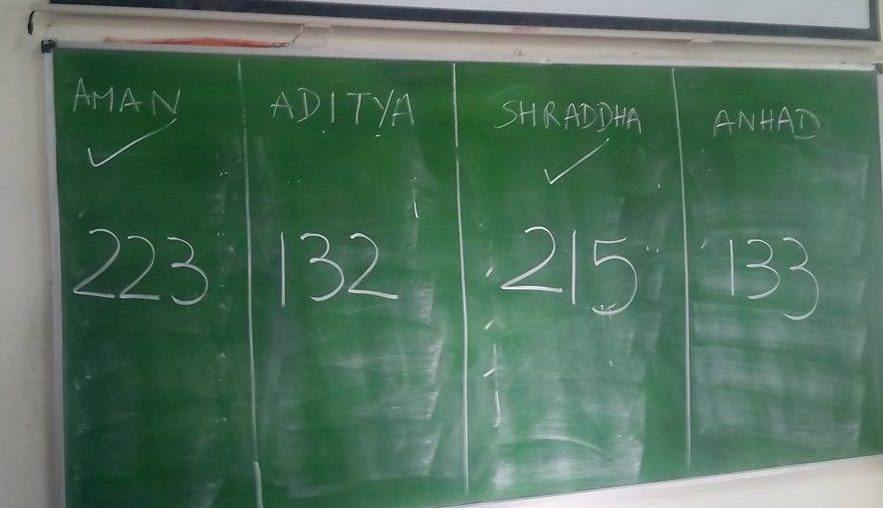This article was written by Osho Chhel (Batch of 2018).
A brutally honest polemic. I have been guilty of multiple occurrences mentioned here, but this is an attempt to convey a larger point, at the risk of seeming deeply hypocritical.
Election time. Fire up your emails, marshal your finger-strength, for we need to fight for our causes. This is the time when we question our candidates, decipher their stances, hold them accountable. Now is when the policies for the coming academic year are decided. Now is when we raise our voice to get the most relevant concerns out. Of course. That is exactly what we do. Or, now is when we use Excel. Now is when we figure out our vote-banks (seriously?), and now is exactly when we play to the opponent’s weaknesses, when we fire up WhatsApp groups to delicately string together the perfect Doom’s Day narrative against the opposing candidate. Or, we claim to be neutral. We claim to decide based on mandates, debates, and conversations. We enjoy the escalator ride to our pedestal, and relish being “above it all”.
In it or outside it; involved or disengaged, we have an opinion about elections in college. And why shouldn’t we? This is the one time we get to formally state our “collective will” and determine how our life in Law School will be governed. This is when we, as Law Schoolites, repose faith in one of us to get us the best outcomes from the administration. Elections are that one event which let us show how much we care.
But, do we?
If the lack of collective action were a disease, Law School would be the septic gangrene. We appear to be deeply concerned by every little act or symbol of injustice that pops up on our Inbox, but are almost as reluctant to ever see that cause through. We have a quarrel about our mess food, coupons, internet, opinion polls, and the Geeta, but rarely display any ability to step out of our laptop screens to have any tangible outcome realized out of these discussions. In our place in college, where we identify ourselves individually to be a certain kind of person, with a certain kind of image to maintain, we find it important to consistently maintain that character and find our antagonists to direct our ire towards. If I am a rule-formalist, I will insist you seek permission before batting an eye-lid, because that might vitiate the process in some way. If I am a radically secular person, anything which gives a whiff of faith must be quashed. But most importantly, if I am a person who has entered law school with a set objective of deriving a very simple, materialistic goal out of this place (dare I say Law Firm job), my default response will be either one of apathy, or confrontational, to the extent that it hinders my achievement of that materialistic goal which I have set for myself. If the internet is bad, I will demand that my exam is rescheduled, because why do I care whether it is a sensible demand, if it is inconvenient for me, it’s heresy.
That is the backdrop of the elections this time around. There was minimal talk about a genuine protest against the administration about the terrible state of faculty. There was near silence about how we must help incoming students who face a distinct educational and linguistic disadvantage in learning the law. And most importantly, there was only talk of who can better “deal with” the behemoth that is the administration, and no talk at all of someone who might be actually capable of seeing to their change in attitude. Yes, these might be idealistic expectations which are mostly rubbished at inception, but the lack of any demand on this front, or any initiative on part of the candidates to carry out these measures shows that we as a community have entirely given up any drive towards fixing this place. We have internalized this idea that we are here for a limited period of time, and in that time, we should only look to public office as a tool to minimize our immediate troubles, or guarantee our entitlements. Such a mindset, then, leads to us losing sight of whether our demands or claims are justified at all. Thus, we start asking for an MFA on an FA on a Repeat, because we think we aren’t prepared enough. Thus, we bypass the established mechanism of Financial Assistance and claim compensation for an excuse of a tournament we attended when on holiday, even though we were not the team selected for it through college. And we think that all of these are legitimate claims.
This will obviously mean that our idea of what our Office Bearers must do will be hackneyed. Such a mindset will necessarily mean that our President must only seek to get us incremental gains which prevent us from any further inconvenience (getting a pliable UGC Chairperson), or only damage control when it comes to terrible faculty, but never really push for long term, tough decisions. This was clearly evidenced when a batch voted to retain an objectively poor, ill-trained teacher for their class, because they preferred to sleep in class and get easy grades, rather than have something meaningful taught to them for a change. Such behavior will necessarily mean that we render the post of our Office Bearers impotent, for we ourselves have no clear motivation of making any long term change.
So now, when we talk about scrutinizing mandates and stances, and when candidates talk about “making Law School great again”, it becomes ever so easy to see through this one-week long charade of pretending to care as we see empty audiences at the Presidential debates, and cliffhangers on mail threads calling for protest. I do firmly believe that incumbent Office Bearers can do a course correction. The temptation of having an “easy year” often prevents Presidents from taking bold steps towards change. This requires, firstly, an acknowledgment on part of everyone that we do primarily act on the basis of our self interest, and our public choices are made having that in mind. I do not say this pejoratively, but I think an acknowledgment of this sort is necessary. It is important simply because only when we understand that we are so self-driven can we allow for some concessions to our self interest for public good. Only when we understand, for example, that a demand for a general extension is essentially a self-interested one can we move forward to denounce that demand, and allow the SBA to communicate with the authorities that such a general extension might not be necessary. Further, this will engender an environment where the Office Bearers would be confident to state that certain demands and stances are possibly illegitimate, and we need to put our foot down and move towards a better system, even if it means a certain sacrifice right now. It is only my hope, therefore, that one day, those who hold Office use it to exercise moral authority over the student body, so that the next time we are presented a bad teacher, we do end up showing them the door, and now allow our apathy be the reason behind them entrenching themselves in Law School.


Osho ka 5th year SBA election plan just imploded.